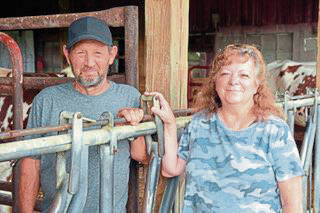https://mirror.triblive.com/local/westmoreland/sewickley-farm-earns-conservation-award-thanks-to-management-practices/
Sewickley Township farm earns conservation award thanks to management practices

The Lash family of Sewickley Township knows a few things about keeping a farm going. They’ve kept their family farm running for more than two centuries and recently were named Conservation Farmers of the Year by the Westmoreland Conservation District.
Once a dairy operation, the Lashes have had to make changes over the years, some aimed at maintaining a viable business, others aimed at preventing erosion and water runoff and limiting the loss of prime agricultural soil.
In 2019, Craig Lash made the difficult decision to sell the farm’s milking cows.
“We just couldn’t grow big enough to make it work,” Lash said, citing the nation’s ongoing milk surplus and resulting depressed prices for raw milk.
Today, Lash’s farm near West Newton has a herd of about 20 “foster cows.” They take in calves from another Westmoreland County dairy farm, using their years of experience to care for the calves until they reach roughly 2 years old.
“We’re raising heifers and making hay,” Lash said.
Lash and his wife, Eleanor, manage the farm, along with sons Craig Jr. and Scott and daughter Rebecca and their families.
In the fields, reduced tillage practices limit the loss of the farm’s soil, and planting the hay and cornfields in line with the land’s contour slows the flow of water.
Lash’s parents, Lowell and Sally, who ran the farm until they retired in 1997, still live on the property — which has been in the family for more than 225 years.
The conservation-minded operation uses a blend of practices to prevent erosion and manage water runoff.
“I’ve been involved with the Conservation District and its programs for a while now,” Lash said. “They helped us contour our fields to match the contours of the land, work on minimum tillage and those types of things.”
Lash also is a member of the USDA’s Natural Resources Conservation Service.
“They help with things like rotational grazing,” he said. “I figure the programs are there. Why not use them?”
Rotational grazing limits the pasture area where animals graze, giving other areas a chance to re-grow plants for future foraging.
In addition, a 930-foot grass “waterway” installed about 12 years ago diverted stormwater from a wet area of the farm and has created a field with the perfect conditions for growing alfalfa.
Lash also takes that alfalfa and has it analyzed, breaking down the nutritional content to determine for fiber, nitrogen, protein and mineral levels. It gives him a better sense of how much forage his cows are likely to consume and how much supplemental protein they will need — all things that help improve milk production when the cows are returned to their home farm.
Lash said the family farm was one of the early participants in the county’s Agricultural Land Preservation Program, which he said helped put them on the path to winning the award.
“When you’re in that program, you have to follow the Conservation District plans for all different kinds of things, like manure management,” he said.
In addition, Lash has served as president of the Westmoreland Fair board for nearly a quarter-century, and the family farm is headed into its second year trying out a corn maze and hay ride for families.
“When you manage a farm, pretty much anything you can do to make money, you want to try out,” he said.
Copyright ©2025— Trib Total Media, LLC (TribLIVE.com)
